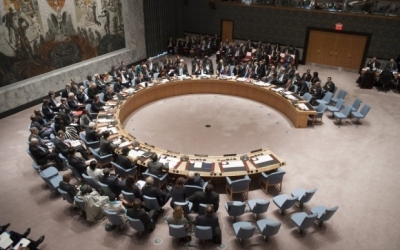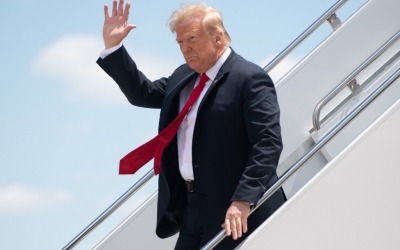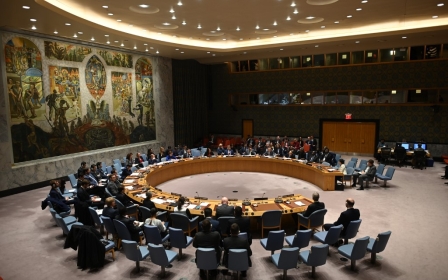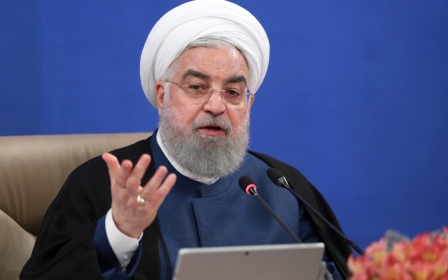Tensions flare at UN Security Council over 'illegal' US move to reimpose Iran sanctions

The Trump administration's official request to restore all UN sanctions against Iran has triggered a showdown at the UN Security Council, with both allies and opponents immediately labelling the initiative "illegal".
US Secretary of State Mike Pompeo insisted on the US's right to "snap back" UN sanctions on Thursday, despite President Donald Trump's 2018 withdrawal from the UN Security Council-endorsed nuclear deal between Iran and six major powers.
Russia, China, Britain, France and Germany came together in a rare alliance to declare the US's proposal illegitimate, saying Washington could not both withdraw from the deal and trigger a resolution within the accord to re-impose sanctions.
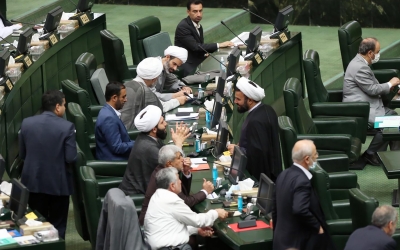
It is unclear how the dispute will play out in the weeks ahead, but Washington's determination to push through its proposal despite widespread opposition has set up a clash at the UN that could very well result in a crisis of credibility for the UN's most important and powerful body.
The controversy has been played out for months, but tensions intensified on Thursday when Pompeo delivered a letter to Indonesia's UN ambassador, Dian Triansyah Djani, whose country currently holds the rotating presidency spot at the Security Council.
The letter is considered by the US to be an official request to trigger a "snap back" of UN sanctions, while the other council members assert that its legal power is null and void.
In his letter, Pompeo cited significant Iranian violations of the nuclear deal, formally known as the JCPOA, and argued that Tehran had broken the accord and deserved to have sanctions reimposed.
The top US diplomat also called Iran "the world’s largest state sponsor of terrorism" and vowed that America would never permit it to have nuclear weapons.
Controversy at the Security Council
In a nod to the US's related push to stop a UN arms embargo on Tehran from expiring in October, Pompeo also said that Washington would not allow Iran to ever "freely buy and sell planes, tanks, missiles, and other kinds of conventional weapons".
The arms embargo, which prohibits Iran from ballistic missile testing and nuclear enrichment that could lead to a nuclear weapons programme, remains Pompeo's most immediate concern
The US last week proposed to indefinitely extend the arms embargo, which failed to pass, as even Washington's allies Germany, France, and the United Kingdom moved against the motion.
On Thursday, Pompeo accused the European nations of agreeing with the US in private but lacking courage to say so publicly, all the while proposing "no alternatives".
"Instead they chose to side with ayatollahs," Pompeo said. "Their actions endanger the people of Iraq, of Yemen, of Lebanon, of Syria and indeed their own citizens as well."
Following Pompeo’s half-hour meeting, Security Council President Djani began one-on-one consultations over the legality of the US's initiative with the body's other 14 members.
The rules of the nuclear deal say that after a signing member requests a sanctions snap back, the security council has 30 days to object by passing an opposing resolution. If such a resolution does not pass, the pre-JCPOA sanctions are supposed to be triggered.
On the other hand, diplomats told the Associated Press that the majority of the members probably informed Djani that the US is not legally entitled to invoke measures within the nuclear deal because of its pullout, so technically the US's motion should be considered illegitimate.
If the US's letter on Thursday is indeed respected as a legal mechanism, then there is no chance for it to be blocked at the Security Council by a resolution, since Washington could just use its veto power to shut down any opposing motion.
'Definitely doomed to failure'
During a phone call on Thursday, Iran's Foreign Minister Mohammad Javad Zarif warned UN Secretary General Antonio Guterres that the Security Council must resist Washington's demands.
"This would have dangerous consequences for international law. It will bring nothing but the destruction of international mechanisms and it will discredit the Security Council," Zarif said.
At a news conference, Iran's UN Ambassador Majid Takht Ravanchi seemed confident that the Security Council would reject the US move as a violation of international law, noting that it "has not enjoyed the political support" of council members.
The US initiative "is definitely doomed to failure", Ravanchi said.
Despite widespread arguments over the legality of the US's move, Pompeo has appeared confident the UN sanctions would be re-imposed in 31 days and has indicated that the US may impose sanctions on countries that don’t enforce them.
European signatories are still hoping an agreement might be reached before 18 October, when the arms embargo is set to expire. Such an agreement would need to bridge the disagreements between Russia and China, who support its lifting, and the United States, which seeks an indefinite extension, diplomats told AP.
The Russians have been the most outspoken critics of the US initiative, with Russia's deputy UN Ambassador Dmitry Polyanskiy suggesting Washington was out of touch with reality.
"Looks like there are 2 planets. A fictional dog-eat-dog one where US pretends it can do whatever it wants without ‘cajoling’ anyone, breach and leave deals but still benefit from them, and another one where the rest of the world lives and where intl law and diplomacy reign," Polyansky tweeted after Pompeo delivered his official request on Thursday.
Russia then asked for an open council meeting to take place on Friday to discuss implementation of resolution 2231 endorsing the nuclear deal which the Trump administration rejected.
An unspoken consideration for many Security Council members in this dispute is the US's upcoming presidential election on 3 November, particularly because a Joe Biden presidency would likely preserve the JCPOA, given Biden's support for the nuclear deal, which was penned when he held the office of vice president under the Obama administration.
Middle East Eye delivers independent and unrivalled coverage and analysis of the Middle East, North Africa and beyond. To learn more about republishing this content and the associated fees, please fill out this form. More about MEE can be found here.


